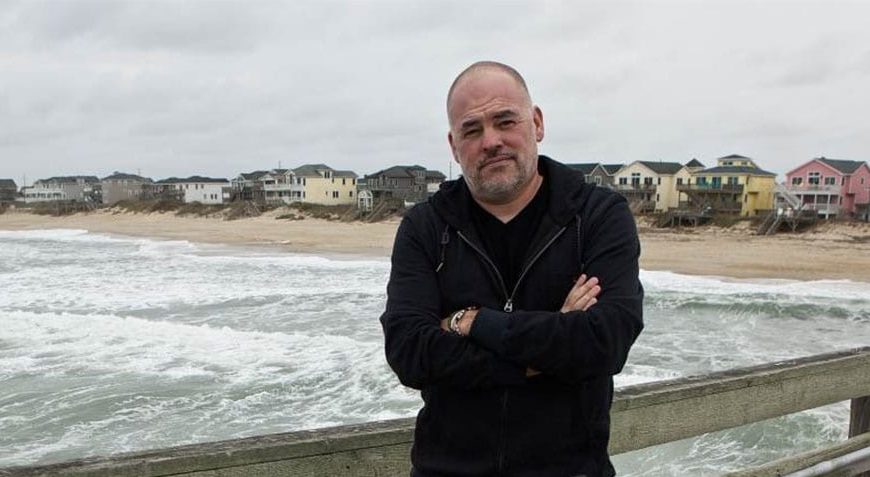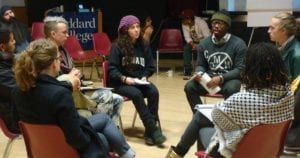
We are witnessing a regression. It’s painfully honest, and could be very powerful if conjoined with mature reflection, but otherwise, yes, it comes across as an immature tantrum. And while the reality is that bad parenting does often result in permanently wounded, permanently immature children…the challenge of writing is to transcend that damage, to create an authorial voice that is the voice of objective perspective. That voice may be a reach; just think of all the wounded authors who manage to write as if they had the wisdom of Merlin, yet then kill themselves. But it’s nevertheless necessary for truly great writing. It’s the voice of our better selves.
This is a comment I wrote three years ago in response to a student’s annotation about an author who’d failed to lend mature perspective to a scene of childhood trauma. The result was what I termed “regression,” rather than the desired reflection. I was writing about approaches to writing.
This week, following the U.S. President’s pro-white nationalist tantrum before the press in the wake of the Charlottesville terrorist attack (remarkably deemed as such by Attorney General Jeff Sessions), it seems that we are witnessing a regression of a whole different order of magnitude. It is a regression of spirit, of values, of intellect, and most certainly of maturity. Trump’s whining, complaining, impulsivity, and vitriolic outbursts amount to the exact opposite of mature reflection. His insistence on ignoring both the crimes that have been visited on people of color throughout American history, and the fundamental principles of social justice that our government is charged with defending, amounts to willful and regressive racism. This is a man who acts and thinks not just like a child, but also like a child of a much earlier era in our nation’s history. A time of Klan rallies on Pennsylvania Avenue. A time of lynchings and cross-burnings, of America First and fascism, the American Nazi Party and the John Birch Society. A time of civil war. Whether his immaturity is the result of bad parenting, or of a disastrous accident of genetics, is anyone’s guess. As far as America’s future is concerned, that’s immaterial. The question that I’m grappling with is: How do we as writers answer the regression we’re witnessing? How do we muster the voice of our better selves to reverse the damage this administration is doing to our country?
It’s not enough to vent our own painfully honest rage and hurt. Those raw, true emotions must be twinned with mature reflection. Imagine, if we were writing a memoir ten years from now about our collective experience living through the Trump presidency, how would we distill these daily episodes of shock and horror into a story rich with meaning?
One obvious and inconvenient answer is that we would work through distance. Insightful writing always employs both immediacy and distance. The challenge in composing any remembered scene is to retrieve the passion and brutal details from the past, while also bringing to bear the insight gained while moving forward through time, space, and reflection: to transcend that damage, to create an authorial voice that is the voice of objective perspective.
But how can we find that distance when writing about events that threaten to swallow us at the very moment we are writing about them? I think the answer is to recognize other forms of distance and – this is the tough and important work – to reach across them.
If this past year has taught us anything, it’s that race is just one – if arguably the deepest — of many, many fault lines fracturing America. The dividing lines are socioeconomic, political, religious, geographic, ethnic, and gendered. We are split by educational level and professions, physical ability, eating habits, even entertainment preferences. Consider the misogyny in the gaming industry, or the targeting of the LGBT community in the Orlando nightclub massacre, or the attack by pro-gun conspiracy theorists against the parents of victims in the Sandy Hook school shooting. These all come on top of the police killings of unarmed black males, such as Tamir Rice, Eric Garner, and Michael Brown.
It’s no accident, of course, that racism, antisemitism, misogyny, homophobia, and conspiracy theories tend to cross-pollinate. This cross-pollination is being engineered by social and Web-based media and on-air shock jocks, politicians, and groups such as the NRA, for both influence and profit. The more distance these engineers of bigotry can create between us, the more power they gain.
The role of writers of conscience is to close the gap. We can do this by meeting and exploring the other sides of the issues that divide us, by engaging the people who don’t look or think like us, by investigating the values and assumptions that shape their beliefs – and by searching for common ground. The goal is not to surrender or convert, but to understand and then to share that understanding through our own acts of expression.
Writing is an ideal form for this gap-closing enterprise, because literature is intrinsically an expression of empathy. In order to access a story, both writers and readers must turn on the neurons involved in empathy. When literature works, we feel a character’s pain and joy as if it were our own — even if the character is the villain of the story.
Our challenge as writers living through the Trump era, then, is to try to connect with the figures we consider the villains, as well as with the victims of this story, and then bridge the gap between them in in our readers’ minds. One role model for this enterprise is the comedian W. Kamau Bell, whose series on CNN inspires me no end. United Shades of America has taken Bell, an African-American man, to a Klan rally, to Standing Rock, to coal country, and to interview white supremacist leader Richard Spencer. Bell closes the gap between his own views and those on the other side through humor and curiosity, by listening openly and reflecting calmly and honestly. By leading with questions instead of reflexive, regressive judgment. And yes, by being strong and brave enough to put himself in mighty uncomfortable situations. In that sense, I consider W. Kamau Bell a hero. He is doing what tragically few ordinary Americans are doing today. He is also doing what we writers must.
Our words are our tools, as well as our weapons. They can fight injustice and deliver truth to power, and they can also open the lines of productive communication between enemy camps. They can supply the understanding that generates insight and change. Our words can make sense of the violence we’re witnessing. They can inspire compassion. Most of all, they can motivate Americans to pull together instead of apart, to stop surrendering to regression and start moving forward again.







